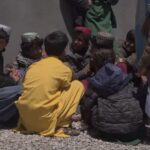The trucks rumble across the border, packed with men, women, and children—their lives reduced to whatever they can carry. Some clutch paperwork from the UN refugee agency. Others have nothing but the clothes they wear. They are Afghan refugees, and Pakistan is sending them back to a country that is no longer home—to a regime that may kill them.
This is not just a deportation drive. It is a death sentence for many. And it will unleash a humanitarian catastrophe that Pakistan, Afghanistan, and the world are woefully unprepared to handle.
A Broken Promise of Refuge
When the Taliban seized Kabul in 2021, Pakistan positioned itself as a savior, offering shelter to fleeing Afghans. Many of those now being deported arrived with that promise in mind—especially women activists, journalists, and former government workers who knew the Taliban would target them.
But today, Pakistan has turned its back on them. Officials claim the deportations are about national security and economic strain. Yet there is no evidence that Afghan refugees are a major security threat. Instead, this policy appears driven by political posturing—a way to distract from Pakistan’s own crises by scapegoating the vulnerable.
The Human Cost: Poverty, Persecution, and Desperation
For those being forced back, the consequences are dire.
- Activists and Journalists Face Death – The Taliban have already hunted down former officials and women’s rights defenders. Those deported from Pakistan will be at immediate risk of arrest, torture, or execution.
- Families Plunged Into Poverty – Many Afghans in Pakistan ran small businesses or worked jobs that fed entire families. Now, they return to an economy in freefall, where jobs are scarce and hunger is rampant.
- Children’s Futures Stolen – Girls who attended school in Pakistan will now be barred from education. Boys may be forced into labor—or worse, recruited by militant groups.
Afghanistan cannot support this influx. The UN estimates that two-thirds of the population already relies on aid to survive. How will it absorb hundreds of thousands more with no homes, no jobs, and no food?
Pakistan’s Self-Defeating Policy
Islamabad may think deporting Afghans will ease its economic troubles, but the opposite is true.
- Labor Shortages Will Hit Key Industries – Afghans work in construction, agriculture, and trade—sectors that rely on their labor. Removing them will disrupt supply chains and raise costs.
- Loss of Cross-Border Trade – Many Afghan refugees were part of vital commerce between the two nations. Their expulsion will hurt Pakistani merchants too.
- International Backlash – If Pakistan continues violating refugee rights, it risks losing Western aid and facing condemnation from human rights groups.
The World’s Complicity
Western nations share the blame. The U.S., EU, and others pledged to resettle at-risk Afghans but have processed applications at a glacial pace. Now, Pakistan’s deportations are happening faster than asylum approvals.
Where is the urgency? Where is the global outcry?
What Must Be Done
- Pakistan must pause deportations – At least for registered refugees, women, journalists, and activists.
- Western nations must fast-track resettlement – Visas for high-risk Afghans should be expedited immediately.
- Humanitarian aid must be scaled up – The UN and NGOs need funding to support returnees in Afghanistan.
Conclusion: A Choice Between Cruelty and Compassion
This is not about politics. It is about human lives. Pakistan’s deportations will not make the country safer or richer—they will only deepen suffering on both sides of the border.
The world cannot look away as thousands are sent back to persecution and starvation. History will judge us by how we respond.
Will we choose cruelty—or compassion? The time to decide is now.



